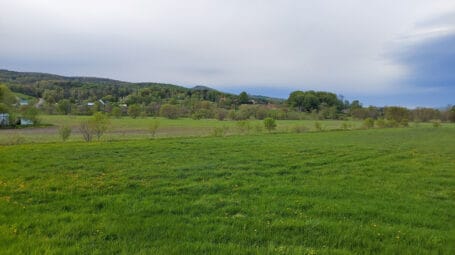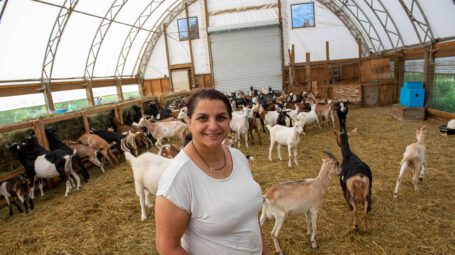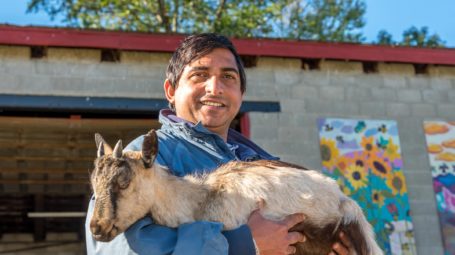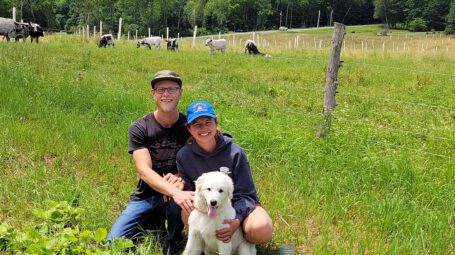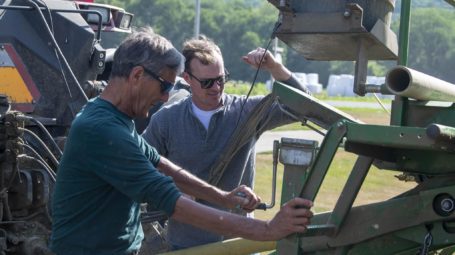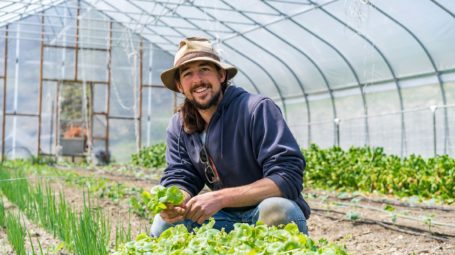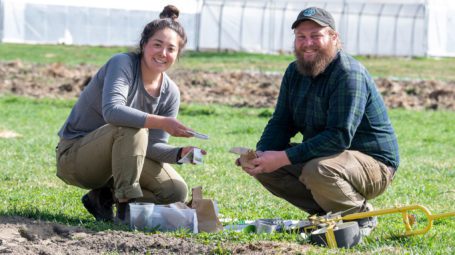- Conserving farmland since 1977
- Acres of open farmland conserved 158,000
- Farmers who bought their first farm 100+
- Farmstands on VLT-conserved farms 75
Protect Your Farmland
Most of the farms that dot Vermont’s landscape are family farms. They are loved, cared for, and central to the identity of the communities they are part of. It’s no wonder that so many farmers have chosen to conserve their land. Farming is also dynamic. Farms change as business or family circumstances change. As a farmer, you might want to expand, diversify your operation, pay down debt, or retire. In addition to protecting productive farmland for generations to come, conservation can provide money and/or tax benefits to support these changes.
Through land conservation, farmland is permanently protected in exchange for the sale (or donation) of development rights and other environmental protections.
If conservation is right for you, we help you navigate the process from start to finish. We support you in applying for funds (often through state and federal agencies). As part of this, we help you figure out the size and value of your conservation easement, manage the legal process, and write any management plans needed for funding.
Next Steps
Transfer or Sell Your Farmland
Maybe you are ready to retire or downsize. Or perhaps you have inherited a farm that’s beyond your ability to care for. Either way, you want to see your land stay in production and have new farmers pick up the reigns. There are a few ways we can help:
- Work with us to conserve your land. This is one way to make farmland more affordable to the next buyer while protecting the land.
- Work with us to find the right buyer. In certain instances, we help to transfer farms from one owner to the next by matching sellers to buyers. At times, we also temporarily hold and lease land to new farmers.
- Stay in touch. Through our network, we talk with hundreds of farmers each year, many of whom are ready to make a life change. We connect people to one another and resources to support successful transfers.
Next Steps
Buy Farmland
Are you ready for a farm of your own, but the barriers to buying land, starting a business, or growing a business feel insurmountable? Or, do you have a small plot but need more land to expand? We can guide you—either through our own programs or by connecting you one of our many partners.
Here are some of the ways we help farmers get land of their own:
- We buy conservation easements on farm that are in transition. In these cases, the farmer selling the farm has connected with a farmer who wants to buy the land; money from sale of the conservation easement reduces the overall cost of the land for the new farmer.
- Through our relationship in the farm community, we connect farmers looking for land with available conserved farms.
- We buy productive farms at risk of going out of production and find new farmers for the land. We will often lease the land to the new farmers to give them the time they need to move into full ownership.
When we work with farmers who want help buying land, we seek people who have:
- At least three years of farming experience, ideally as a manager or business owner.
- The desire to operate a commercial farm operation.
- Are focused on producing food, medicine, flowers, or fiber on at least 20 acres.
Next Steps
Improve the health of water and soil
Farmers are not just landowners and business owners; they are also environmental stewards. The health of rivers, lakes, and steams depend (in part) on the actions you take. We are here to help.
Most farms have diverse ecosystems—wetlands and rivers, wildlife habitat, floodplain forests, and meadows — just to name a few. And the farm’s soil holds nutrients, stores carbon, and filters water. To improve the health of your land and water, we can:
- Organize the hands-on restoration of wetlands, tree planting days along rivers and streams, and wildlife habitat improvement projects.
- Buy conservations easements that protect the natural flow of a river, establish wooded areas along rivers and streams, and protect unique ecological features. Often these easements will restrict some farming practices in protected areas.
- Help owners of conserved farmland enroll in programs that promote water or soil health.
In each of these instances, we offer support from start to finish. We help you scope projects, find funding, and complete the work.
Next steps
Get Help with Your Conserved Land
If you own land conserved with the Vermont Land Trust you likely know us well.
Every year, we reach out to see if you are planning any changes to your land or if you need advice about land management. We also visit all conserved land periodically to connect with you, answer your questions, and to document any important changes. Often conservation easements require landowners to get our approval before making a change, such as conducting a commercial timber harvest or building a new barn.
We are only a phone call or email away and look forward to helping you.
Next Steps
Access Grants and Resources
The Eric Rozendaal Memorial Award is a $5,000 grant we make each year to a farmer who honors the legacy of Eric’s stewardship ethic, community mindedness, and entrepreneurialism.
We also offer a yearly Land Stewards Award to juniors and seniors in each of Vermont’s vocational and technical schools who are pursuing careers in farming, sugaring, or forest management. Many of these inspiring students have gone on to work at, or own, farming businesses across the state.
We strive to support the 2,000+ owners of conserved land, many of whom are farmers, by connecting them with grant and other financial opportunities. For more information about resources and services available to farmers, visit our partners’ websites, including: the Farm and Forest Viability Program, The Intervale Center, Northeast Organic Farming Association of Vermont, and the Center for an Agricultural Economy


